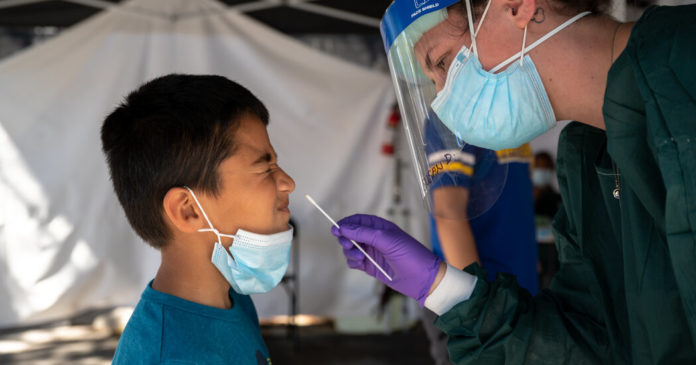
“I am very concerned that if we don’t commit the resources now, it will only get harder, and less likely, in the years ahead,” Mr. Daschle wrote in an email. “Now is the time to apply lessons learned.”
Some Democrats have repeatedly called for the initial $30 billion to be included in the budget package. Among them are Senator Patty Murray, Democrat of Washington and the chairwoman of the Senate health committee, and Senator Elizabeth Warren, Democrat of Massachusetts. Ms. Warren and six of her Democratic colleagues recently wrote to the House and Senate leaders of both parties, calling on them to include $30 billion in the budget package “to prevent and prepare for future pandemics.”
Understand Vaccine and Mask Mandates in the U.S.
-
- Vaccine rules. On Aug. 23, the Food and Drug Administration granted full approval to Pfizer-BioNTech’s coronavirus vaccine for people 16 and up, paving the way for an increase in mandates in both the public and private sectors. Private companies have been increasingly mandating vaccines for employees. Such mandates are legally allowed and have been upheld in court challenges.
- Mask rules. The Centers for Disease Control and Prevention in July recommended that all Americans, regardless of vaccination status, wear masks in indoor public places within areas experiencing outbreaks, a reversal of the guidance it offered in May. See where the C.D.C. guidance would apply, and where states have instituted their own mask policies. The battle over masks has become contentious in some states, with some local leaders defying state bans.
- College and universities. More than 400 colleges and universities are requiring students to be vaccinated against Covid-19. Almost all are in states that voted for President Biden.
- Schools. Both California and New York City have introduced vaccine mandates for education staff. A survey released in August found that many American parents of school-age children are opposed to mandated vaccines for students, but were more supportive of mask mandates for students, teachers and staff members who do not have their shots.
- Hospitals and medical centers. Many hospitals and major health systems are requiring employees to get a Covid-19 vaccine, citing rising caseloads fueled by the Delta variant and stubbornly low vaccination rates in their communities, even within their work force.
- New York City. Proof of vaccination is required of workers and customers for indoor dining, gyms, performances and other indoor situations, although enforcement does not begin until Sept. 13. Teachers and other education workers in the city’s vast school system will need to have at least one vaccine dose by Sept. 27, without the option of weekly testing. City hospital workers must also get a vaccine or be subjected to weekly testing. Similar rules are in place for New York State employees.
- At the federal level. The Pentagon announced that it would seek to make coronavirus vaccinations mandatory for the country’s 1.3 million active-duty troops “no later” than the middle of September. President Biden announced that all civilian federal employees would have to be vaccinated against the coronavirus or submit to regular testing, social distancing, mask requirements and restrictions on most travel.
“The Covid-19 pandemic has made clear that underinvesting in our public health infrastructure, our biomedical research pipeline and our medical supply chain has disastrous consequences,” the senators wrote.
Committees are still negotiating the details of the budget package, and several people familiar with the plan said the White House announcement on Friday might be an effort to press leaders on Capitol Hill — especially Senator Chuck Schumer, Democrat of New York and the majority leader — to get behind the administration’s full $65.3 billion plan and to commit to at least $15 billion in the budget measure.
Mr. Schumer has so far been noncommittal. “I’ve been working and I’ll keep working to make the investments needed to ensure we are fully prepared for future pandemics,” he wrote last month on Twitter.
Dr. Lander was joined on Friday by Elizabeth Cameron, the senior director for global health security and biodefense on the National Security Council — a job she also held in the Obama White House, where she drafted a preparedness document known as the pandemic playbook. She said the Biden plan “very much draws on those efforts,” as well as “on lessons from this pandemic.”
According to documents released by the White House, the plan has five central goals: improving and expanding the nation’s arsenal of vaccines, therapeutics and diagnostics; improving surveillance of infectious disease threats; strengthening the public health system, with a “particular focus on reducing inequities”; building up the supply chain and the stockpile for personal protective gear and other items; and “managing the mission,” by creating a new Mission Control office — a task Dr. Lander likened to the Apollo missions to send astronauts to the moon in the 1960s.
“If you’re getting to the moon, and you have a great booster rocket but you haven’t got a capsule capable of landing or computers capable of directing, it’s not going to work,” he said.







